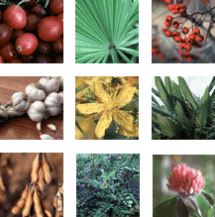From the earliest times, herbs have been prized for their pain-relieving and healing abilities and today we still rely on the curative properties of plants in about 75% of our medicines.
The variety and sheer number of plants with therapeutic properties are quite astonishing. It is estimated that around 70,000+ plant species, from lichens to towering trees, have been used at one time or another for medical purposes.
Herbs, which have always been the principal form of medicine in developing counties, are once again becoming popular throughout the developed world, as people strive to stay healthy in the face of chronic stress, pollution, and to treat illness with medicines that work in concert with the body's own defenses.
Here are some Did You Know Facts? About herbs:
- •Herbs are classified as plants valued for flavor, scent, or other qualities. Any portion of the plant may be considered an “herb,” including leaves, roots, flowers, seeds, resin, root, bark, inner bark, berries, and other plant parts. Herbs are often referred to as Botanicals.
- •Herbs have been used for several thousand years and have been used to help combat illnesses from minor coughs & colds to life-threatening diseases such as tuberculosis and malaria.
- •Herbs are NOT drugs; in fact, they work very differently in the body. Herbs are foundation nutrients working through the glands, and nourishing the body’s most basic elements.
- •Herbs are powerful nutritional agents and work better in combination of two or more complimentary botanicals.
- •Herbal combinations are not habit-forming.
As much as herbal combinations offer fantastic health benefits, there are those individual herbal ingredients and products that have been proven to cause harm. Certain herbs can have adverse effects ranging from nausea and vomiting to life-threatening conditions like liver or kidney dysfunction. For example, in 2002 the U.S. Food and Drug Administration (FDA) released a warning about potential liver damage from kava root, then on of the 10 most popular herbal supplements sold in the U.S. And in 2004 the FDA banned ephedra, a Chinese wight-loss herb, after if was linked to more than 100 deaths. Equally troubling, some supplements and herbal products may be contaminated with dangerous heavy metals, including lead and mercury. Yikes!
Be sure that the herbs you consume are from a reputable company that offers clinical proof, and 100% guarantee that their products are tested and safe.
What herbal products do I recommend to my customers, my family and friends? Shaklee Company offers products that I trust to be safe, clinically proven to work with at 100% guarantee.
Over the next several weeks, I will be identifying specific herbs and herbal combinations from Alfalfa to Valerian and offering tips of how herbs can increase your energy to helping get a restful nights sleep.
Be well~



No comments:
Post a Comment